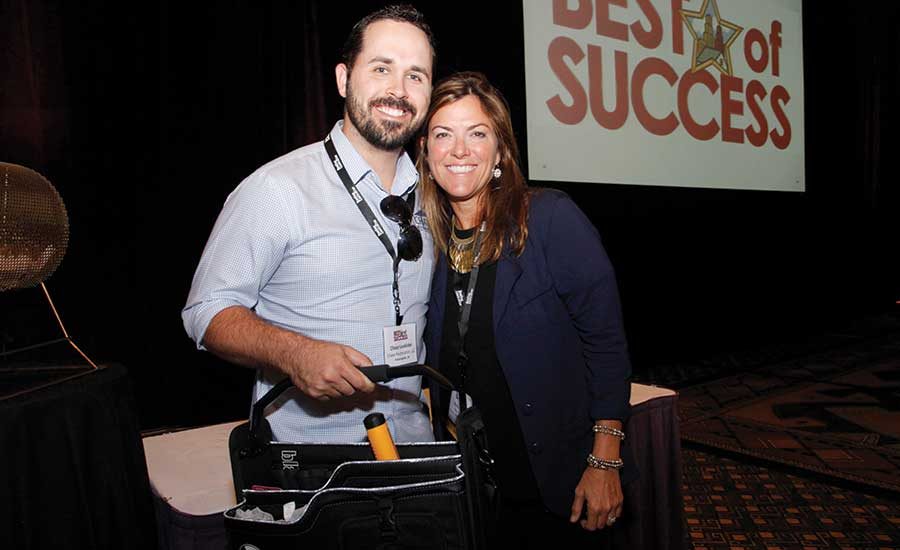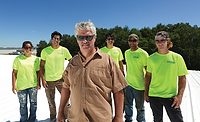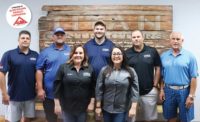Contractor Profile: Chase Restoration, LLC
Former Football Player-Turned Roofing Contractor Utilizes Teamwork and Determination to Drive Business Forward

Chase Lecklider started Chase Restoration, LLC in 2012. He’s pictured (above) with fiancé Chloe Moushey and son, Landon, on a recent trip to the Florida Keys. His company specializes in residential reroofing, including this installation of 117 squares of Smokey Gray DaVinci Bellaforte Slate in Carmel, Ind. Photos courtesy of Chase Restoration, LLC.

Chase Lecklider started Chase Restoration, LLC in 2012. He’s pictured (above) with fiancé Chloe Moushey and son, Landon, on a recent trip to the Florida Keys. His company specializes in residential reroofing, including this installation of 117 squares of Smokey Gray DaVinci Bellaforte Slate in Carmel, Ind. Photos courtesy of Chase Restoration, LLC.

Chase Lecklider, founder of Chase Restoration, LLC, poses with RC’s West Sales Manager Marcia Wright upon winning a free tool set at the 2015 Best of Success conference. Lecklider will present a session on referrals at this year’s conference, Sept. 18-19 in Tucson, Ariz. Photo by Philip Gudenschwager.



Arguably one of the most interesting parts of the roofing business is hearing the unique stories of how people got their start in the industry. Some inherited a family business, many observed their mentors for several years before starting their own business, and others simply learned as they went along, starting from the ground up.
In his own words, Chase Lecklider describes his start in roofing as ‘the definition of insanity.’ Having started his company a mere five years ago, Lecklider’s short time in roofing has been a complex, but gratifying experience that all started in his mid-twenties while working in business-to-business sales. After bouncing around to several jobs that awarded similar pay structures, he landed a job off a Craigslist ad as an uncapped commissioned sales representative for a roofing company. Three years later in 2012, he decided it was time to take control of his future and launched his own company, Chase Restoration, LLC.
“I found myself apologizing for things that made me think, ‘If I owned this company, I would try and avoid these issues,’” Lecklider said.

Chase Lecklider will be a featured speaker at the 2017 Best of Success conference, Sept. 18-19 in Tucson, Ariz.
The company, located in Indianapolis, is home to four non-union employees, and specializes in reroofing with 90 percent residential and 10 percent commercial. They also offer siding, guttering, insulation and painting services. More diverse service offerings propelled the company to 40-percent growth each year since its inception, and Lecklider said he plans to continue that growth moving forward.
The Importance of Teamwork
A mindset that now radiates throughout his business, Lecklider learned the importance of teamwork during his years playing Division I football at Purdue University. He described the experience as incredibly humbling, given his transition from three years as a walk-on player, to earning a scholarship to play his final season with the Boilermakers. He said it was there — on the practice fields and library study rooms — that he learned the true meaning of hard work and perseverance. In Lecklider’s eyes, it’s made him a better roofing contractor.
“When you’re on a team, it’s about more than just yourself,” he explained. “You can play well and lose and you can play terribly and win. At the end of the day, you’re all working together to deliver your product and make a profit.”
That’s exactly how his small but close team operates, by working together to achieve their goals and put forth the best service possible. And it all starts with planning. Each job is developed differently, with all parties coordinating each aspect from installation to job completion. Lecklider said his approach to planning helps the company avoid a lot of problems, and manage the expectations right from the get-go. When a project is finished, a final walkthrough is completed where the customer will then sign-off on a job well done.
Communicating with customers and treating them with respect is a key part of the business, especially since 90 percent of the company’s work comes from referrals. “In this industry if you show up five minutes early, return phone calls and do what you say you’re going to do, you’ll be 95 percent ahead of the competition,” Lecklider said. “Getting customers to start and finish happy is our goal.”
Lecklider’s experience in effectively utilizing referrals as the company’s primary method of marketing will be the focus of his presentation at the 2017 Best of Success conference in Tucson, Ariz.
In addition to illustrating teamwork within his business, he elucidates it outside as well. Lecklider values giving back to the community, and says it plays a large role in his professional and personal life. He donates both monetarily, and by giving his time, and admittedly says he can’t recommend giving back to the community enough. “It makes you feel better, it puts things into perspective. Most importantly, you’re helping someone else,” he said. “I want to surround myself with people who can make my life better … I hope that my employees share my enthusiasm for making this world a better place.”
Recognizing Limitations
Admitting when you’ve done wrong isn’t always easy, but in business, it’s almost always better to take the high road and accept defeat. And hopefully, in the long-term, you’ll learn from such mistakes, and your customers will respect you more because of it.
In an experience that Lecklider described as the worst of his career, his team agreed to take on a project that they were neither equipped for nor prepared to complete. The job was unsuccessful, however, Lecklider learned a valuable lesson along the way — always know your limitations.
“Don’t bite off more than you can chew. We’re not screwing up dinner, these are people’s homes, it’s their most prized possession,” he said. “You have to be perfect on these projects.”
By admitting the flaw, the company was able to recover the customer, who they’ve maintained a solid relationship with to this day.
Since the experience, the company has learned a great deal about managing the process and customer expectations while educating homeowners on all the aspects of their project. Including a current job that’s generated a buzz in the community due to its unique look. The project, a DaVinci slate roof atop a law firm in the company’s hometown, showcases Chase’s ability to communicate and deliver on the promise of redefining quality, service and value on every roof in Indiana.
Spoken like a true football player, Lecklider recognizes that there’s always room for improvement. He believes contractors should encourage one another, and share ideas in a mutually-beneficial environment.
His involvement in several industry associations like the National Roofing Contractors Association and the Midwest Roofing Contractors Association has proved to be an invaluable resource, and one that he recommends other contractors get involved in. “If you can’t afford to join the groups, take a pay cut, because they will return your investment over and over. If you can’t be great, get better until you are,” he said.
Looking for a reprint of this article?
From high-res PDFs to custom plaques, order your copy today!










